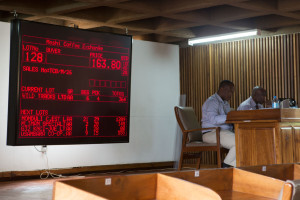by David Brewin

Coffee auction in progress at The Kahawa House, Moshi Photo – Wild Tracks Coffee https://kahawatanzania.wordpress.com/
Lower Coffee Prices
Tanzanian farmers are becoming worried by recent trends in the price of coffee. This is apparently caused by the slowing economic growth in China and the increased likelihood of a rise in US interest rates.
At the Moshi Coffee Exchange in late November, the price of Arabica, mostly from Moshi and Arusha fell. A 50kg bag slumped by over US$6 from what it had fetched at the previous auction. At the same time the price per tonne of Robusta coffee (mostly from Bukoba) in London fell from US$2,000 to US$1,000 which had also not been expected. The result was that for the third consecutive week no Robusta coffee was offered at the auction.
Most Tanzanian coffee is exported to Japan, the EU and the US, but Tanzania hopes to increase its market in east Asia. In 2014, 41,000 tonnes of coffee were exported earning US $121 million. In 2013, 59,500 tonnes had been exported for US $171 million.
Research at Ukiriguru
Using funds from the Bill and Melinda Gates Foundation, projects being implemented at the Ukiriguru Agricultural Research Institute near Mwanza include one which is designed to promote the consumption of micronutrient-rich food.
An assessment is also being carried out at Ukirguru on orange-fleshed sweet potatoes. Tanzania is the second largest producer of sweet potatoes in East Africa after Uganda with an annual production of one million tonnes. In Tanzania the sweet potato is the third most important root tuber crop, after cassava and Irish potatoes.
Farm subsidies
100,000 farmers in 24 regions of Tanzania are expected to benefit from continued farm input subsidies for the cultivation of various crops. The Ministry has said that it will contribute 50% of the market price of inputs to small-scale farmers of maize, rice and paddy in a scheme operated with 23 fertilizer companies and 27 maize and paddy seed suppliers. The inputs are described as a basic right for farmers and not a privilege so farmers are expected to use the funds efficiently to increase productivity of the specified crops. Emphasis is being placed on an increase in crop production, and establishing maize and rice. The research results have so far shown that the national agricultural inputs voucher system has increased not only the production of crops but also increased the number of agro-dealers and availability of inputs.
Yields of Maize and Rice
Farmers in Mbeya region have been benefitting from a project under the Eastern Africa Agricultural Productivity Programme (EAAPP) on research into rice. Tanzania is the base of the Rice Centre of Excellence which is being supported by EAAPP. In the case of certain rice farmers, yields have been improved dramatically. A rice farmer in Sengerema district said that her harvest had grown from 0.75 tonnes per acre to 1.5 tonnes following her training under the EAAPP programme. She had been able to build a new house.
